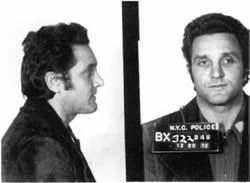Vittorio “Little Vic” Amuso, the 88-year-old former boss of the Lucchese crime family, says his health is failing in federal prison. His lawyers say he has changed, and that he is “staring down his mortality.”
A court filing last week describes his chronic arthritis that restricts him to a wheelchair, his decaying vision, his now-toothless mouth, and the many pleas for help that go unanswered. Amuso often resorts to written requests like this: “I need a cortisone shot in my hip and knee and I’m in severe pain please if there is a god help me with this as I am 90 years old and in severe pain.”
Now, Amuso has applied for compassionate release under the First Step Act of 2018. The results of other organized crime figures have been mixed.
In Amuso’s case, his legal team pointed to his Catholic faith, his perfect record in prison, and his devotion to being a mentor to his kids and grandkids.
“While the underlying offense conduct is admittedly serious, Mr. Amuso is not the same defendant that stood before the court more than 31-plus years ago,” wrote his lawyer Anthony DiPietro. “His circumstances have dramatically and materially changed, as he is now an elderly and very sick man of 88 years of age who is staring down his mortality.”
He was convicted in 1992 of murder and racketeering in a Brooklyn Federal Court trial. Prosecutors linked him to nine murders and three attempted killings.
Michael “Baldy Mike” Spinelli, a former associate of Amuso who will be released from prison in 2026, was denied compassionate release last month by Brooklyn Federal Judge Raymond Dearie.
A few weeks later, another Brooklyn Federal Judge, Margo Brodie, refused to release another mob killer, Vito Guzzo, 58, who was looking for an early release after he was convicted in 1998 of five murders.
Mob capo Anthony Russo, the man who ordered murders during the bloody Colombo crime family civil war, had better luck. Last year, Brooklyn Federal Judge Frederic Block ordered his life sentence cut to 35 years, which led to his release this February.
The bipartisan First Step Act has led to the reduction of more than 4,000 prison sentences since it was signed by then-President Donald Trump in 2018.












